(完整版)从属连词及状语从句.doc
- 格式:doc
- 大小:90.02 KB
- 文档页数:3
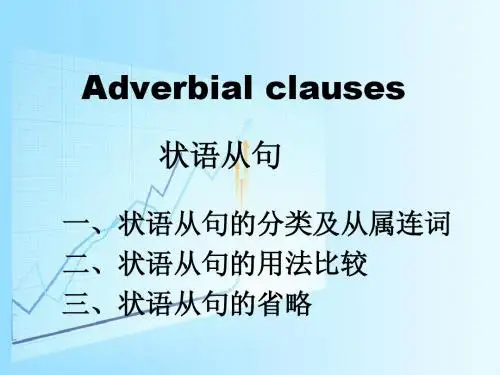
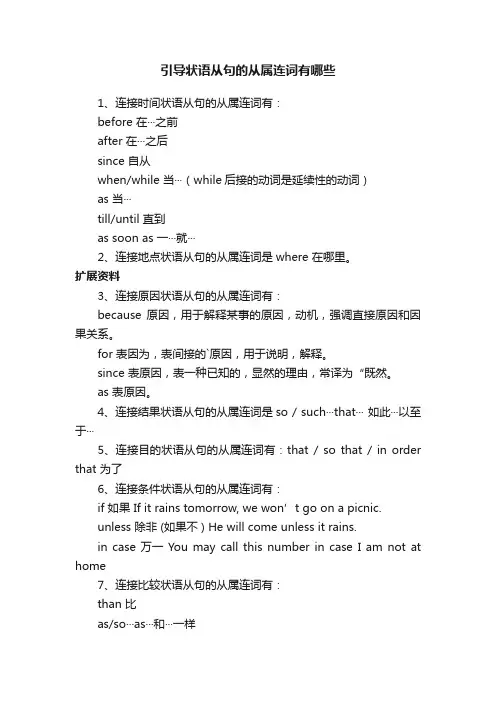
引导状语从句的从属连词有哪些1、连接时间状语从句的从属连词有:before 在···之前after 在···之后since 自从when/while 当···(while后接的动词是延续性的动词)as 当···till/until 直到as soon as 一···就···2、连接地点状语从句的从属连词是where 在哪里。
扩展资料3、连接原因状语从句的从属连词有:because 原因,用于解释某事的原因,动机,强调直接原因和因果关系。
for 表因为,表间接的`原因,用于说明,解释。
since 表原因,表一种已知的,显然的理由,常译为“既然。
as 表原因。
4、连接结果状语从句的从属连词是so / such···that··· 如此···以至于···5、连接目的状语从句的从属连词有:that / so that / in order that 为了6、连接条件状语从句的从属连词有:if 如果 If it rains tomorrow, we won’t go on a picnic.unless 除非 (如果不 ) He will come unless it rains.in case 万一You may call this number in case I am not at home7、连接比较状语从句的从属连词有:than 比as/so···as···和···一样8、连接方式状语从句的从属连词有:as 按照as if / though 仿佛9、引导让步状语从句的从属连词有:although/though 尽管even if 即便。
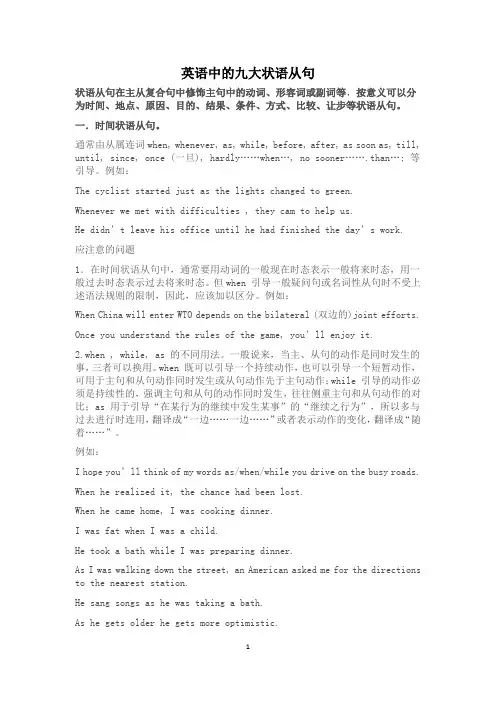
英语中的九大状语从句状语从句在主从复合句中修饰主句中的动词、形容词或副词等,按意义可以分为时间、地点、原因、目的、结果、条件、方式、比较、让步等状语从句。
一.时间状语从句。
通常由从属连词when, whenever, as, while, before, after, as soon as, till, until, since, once (一旦), hardly……when…, no sooner…….than…; 等引导。
例如:The cyclist started just as the lights changed to green.Whenever we met with difficulties , they cam to help us.He didn’t leave his office until he had finished the day’s work.应注意的问题1.在时间状语从句中,通常要用动词的一般现在时态表示一般将来时态,用一般过去时态表示过去将来时态。
但when 引导一般疑问句或名词性从句时不受上述语法规则的限制,因此,应该加以区分。
例如:When China will enter WTO depends on the bilateral (双边的)joint efforts.Once you understand the rules of the game, you’ll enjoy it.2.when , while, as 的不同用法。
一般说来,当主、从句的动作是同时发生的事,三者可以换用。
when 既可以引导一个持续动作,也可以引导一个短暂动作,可用于主句和从句动作同时发生或从句动作先于主句动作;while 引导的动作必须是持续性的,强调主句和从句的动作同时发生,往往侧重主句和从句动作的对比;as 用于引导“在某行为的继续中发生某事”的“继续之行为”,所以多与过去进行时连用,翻译成“一边……一边……”或者表示动作的变化,翻译成“随着……”。
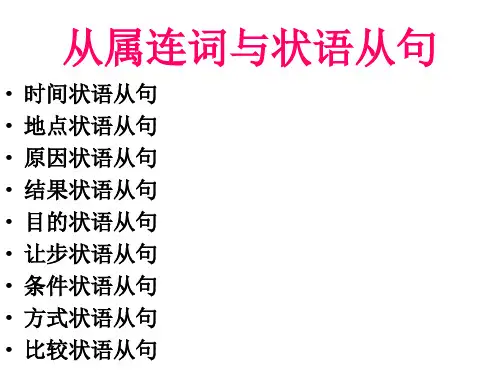
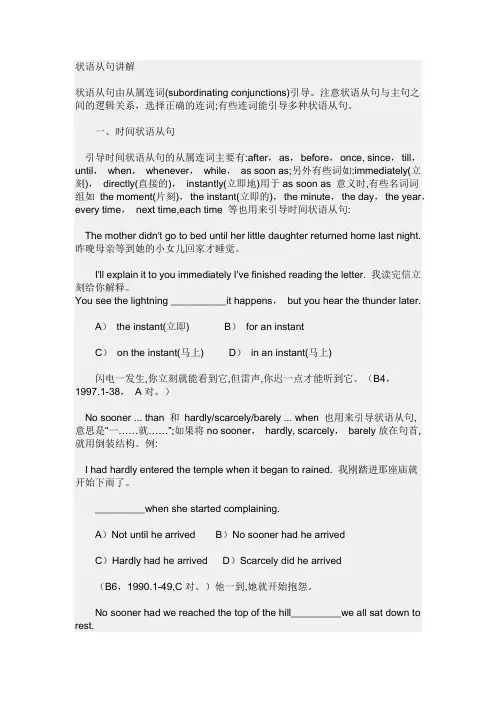
状语从句讲解状语从句由从属连词(subordinating conjunctions)引导。
注意状语从句与主句之间的逻辑关系,选择正确的连词;有些连词能引导多种状语从句。
一、时间状语从句引导时间状语从句的从属连词主要有:after,as,before,once, since,till,until,when,whenever,while,as soon as;另外有些词如:immediately(立刻),directly(直接的),instantly(立即地)用于as soon as 意义时,有些名词词组如the moment(片刻),the instant(立即的),the minute,the day,the year,every time,next time,each time 等也用来引导时间状语从句:The mother didn't go to bed until her little daughter returned home last night. 昨晚母亲等到她的小女儿回家才睡觉。
I'll explain it to you immediately I've finished reading the letter. 我读完信立刻给你解释。
You see the lightning __________it happens,but you hear the thunder later.A)the instant(立即) B)for an instantC)on the instant(马上) D)in an instant(马上)闪电一发生,你立刻就能看到它,但雷声,你迟一点才能听到它。
(B4,1997.1-38,A对。
)No sooner ... than 和hardly/scarcely/barely ... when 也用来引导状语从句,意思是“一……就……”;如果将no sooner,hardly, scarcely,barely放在句首,就用倒装结构。
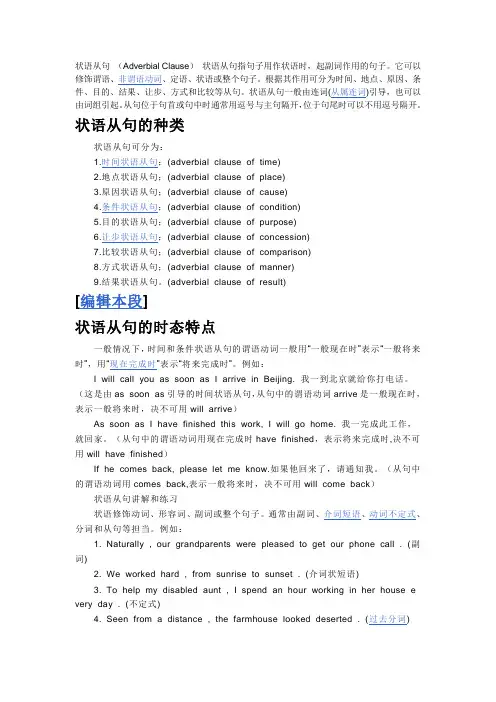
状语从句(Adverbial Clause)状语从句指句子用作状语时,起副词作用的句子。
它可以修饰谓语、非谓语动词、定语、状语或整个句子。
根据其作用可分为时间、地点、原因、条件、目的、结果、让步、方式和比较等从句。
状语从句一般由连词(从属连词)引导,也可以由词组引起。
从句位于句首或句中时通常用逗号与主句隔开,位于句尾时可以不用逗号隔开。
状语从句的种类状语从句可分为:1.时间状语从句;(adverbial clause of time)2.地点状语从句;(adverbial clause of place)3.原因状语从句;(adverbial clause of cause)4.条件状语从句;(adverbial clause of condition)5.目的状语从句;(adverbial clause of purpose)6.让步状语从句;(adverbial clause of concession)7.比较状语从句;(adverbial clause of comparison)8.方式状语从句;(adverbial clause of manner)9.结果状语从句。
(adverbial clause of result)[编辑本段]状语从句的时态特点一般情况下,时间和条件状语从句的谓语动词一般用“一般现在时”表示“一般将来时”,用“现在完成时”表示“将来完成时”。
例如:I will call you as soon as I arrive in Beijing. 我一到北京就给你打电话。
(这是由as soon as引导的时间状语从句,从句中的谓语动词arrive是一般现在时,表示一般将来时,决不可用will arrive)As soon as I have finished this work, I will go home. 我一完成此工作,就回家。
(从句中的谓语动词用现在完成时have finished,表示将来完成时,决不可用will have finished)If he comes back, please let me know.如果他回来了,请通知我。
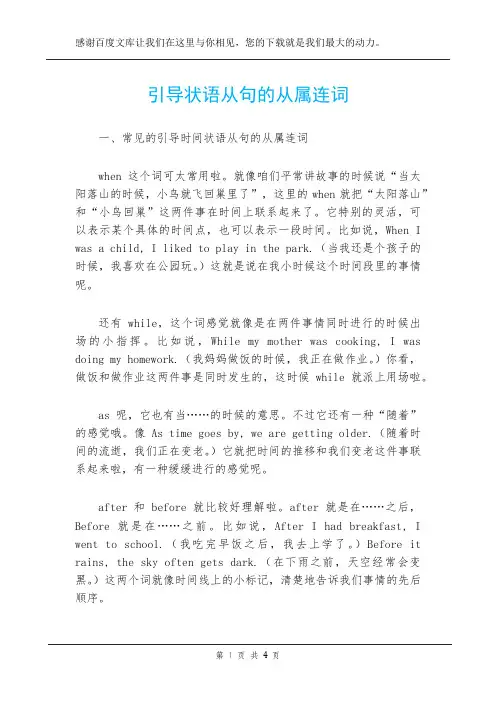
引导状语从句的从属连词一、常见的引导时间状语从句的从属连词when这个词可太常用啦。
就像咱们平常讲故事的时候说“当太阳落山的时候,小鸟就飞回巢里了”,这里的when就把“太阳落山”和“小鸟回巢”这两件事在时间上联系起来了。
它特别的灵活,可以表示某个具体的时间点,也可以表示一段时间。
比如说,When I was a child, I liked to play in the park.(当我还是个孩子的时候,我喜欢在公园玩。
)这就是说在我小时候这个时间段里的事情呢。
还有while,这个词感觉就像是在两件事情同时进行的时候出场的小指挥。
比如说,While my mother was cooking, I was doing my homework.(我妈妈做饭的时候,我正在做作业。
)你看,做饭和做作业这两件事是同时发生的,这时候while就派上用场啦。
as呢,它也有当……的时候的意思。
不过它还有一种“随着”的感觉哦。
像As time goes by, we are getting older.(随着时间的流逝,我们正在变老。
)它就把时间的推移和我们变老这件事联系起来啦,有一种缓缓进行的感觉呢。
after和before就比较好理解啦。
after就是在……之后,Before就是在……之前。
比如说,After I had breakfast, I went to school.(我吃完早饭之后,我去上学了。
)Before it rains, the sky often gets dark.(在下雨之前,天空经常会变黑。
)这两个词就像时间线上的小标记,清楚地告诉我们事情的先后顺序。
二、引导原因状语从句的从属连词because那可是原因状语从句里的大明星啦。
咱们平时解释为什么的时候,就经常用到它。
比如说,I didn't go to school yesterday because I was ill.(我昨天没去上学因为我生病了。
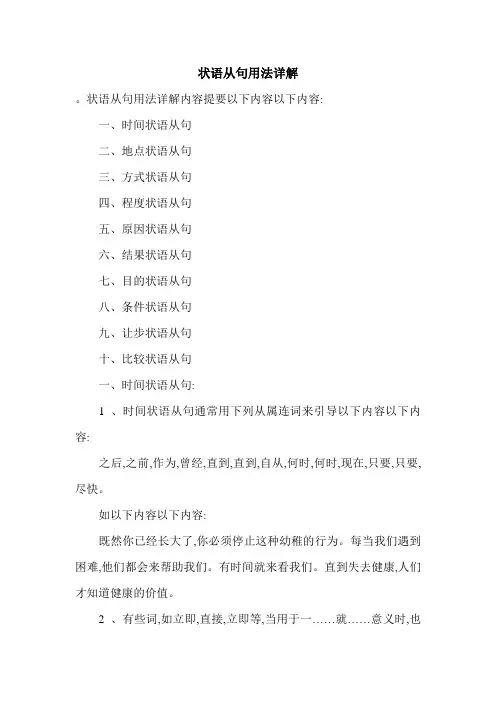
状语从句用法详解。
状语从句用法详解内容提要以下内容以下内容:一、时间状语从句二、地点状语从句三、方式状语从句四、程度状语从句五、原因状语从句六、结果状语从句七、目的状语从句八、条件状语从句九、让步状语从句十、比较状语从句一、时间状语从句:1 、时间状语从句通常用下列从属连词来引导以下内容以下内容:之后,之前,作为,曾经,直到,直到,自从,何时,何时,现在,只要,只要,尽快。
如以下内容以下内容:既然你已经长大了,你必须停止这种幼稚的行为。
每当我们遇到困难,他们都会来帮助我们。
有时间就来看我们。
直到失去健康,人们才知道健康的价值。
2 、有些词,如立即,直接,立即等,当用于一……就……意义时,也可以引导时间状语从句,如以下内容以下内容:我一收到他的信就和他取得了联系。
我姐姐一收到我的消息就来了。
你一按按钮,机器就会启动。
我一听到消息就给你打电话。
你一到那里就会去找它吗?3.某些表示时间的名词词组,如时刻、分钟、瞬间、日期、年份、早晨、每次、每次、下次、第一次等,也可以引导时间状语从句,如以下内容以下内容:你一来,我就告诉你。
我一听到报告就开始了。
她一见到他就知道他是她的哥哥。
每次我感冒,我的背都疼。
下次他来深圳时,我会去看他。
第二次世界大战爆发的那年,他离开了欧洲。
我第一次见到他时,他就给我留下了深刻的印象。
我一收到你的信就开始了。
他一-一、时间状语从句二、地点状语从句三、方式状语从句四、程度状语从句五、原因状语从句六、结果状语从句七、目的状语从句八、条件状语从句九、让步状语从句十、比较状语从句一、时间状语从句:1 、时间状语从句通常用下列从属连词来引导以下内容以下内容:之后,之前,作为,曾经,直到,直到,自从,何时,何时,现在,只要,只要,尽快。
如以下内容以下内容:既然你已经长大了,你必须停止这种幼稚的行为。
每当我们遇到困难,他们都会来帮助我们。
有时间就来看我们。
直到失去健康,人们才知道健康的价值。
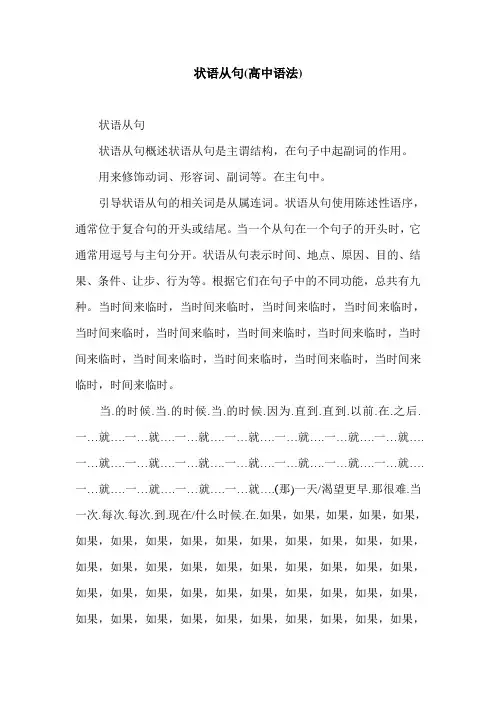
状语从句(高中语法)状语从句状语从句概述状语从句是主谓结构,在句子中起副词的作用。
用来修饰动词、形容词、副词等。
在主句中。
引导状语从句的相关词是从属连词。
状语从句使用陈述性语序,通常位于复合句的开头或结尾。
当一个从句在一个句子的开头时,它通常用逗号与主句分开。
状语从句表示时间、地点、原因、目的、结果、条件、让步、行为等。
根据它们在句子中的不同功能,总共有九种。
当时间来临时,当时间来临时,当时间来临时,当时间来临时,当时间来临时,当时间来临时,当时间来临时,当时间来临时,当时间来临时,当时间来临时,当时间来临时,当时间来临时,当时间来临时,时间来临时。
当.的时候.当.的时候.当.的时候.因为.直到.直到.以前.在.之后.一…就….一…就….一…就….一…就….一…就….一…就….一…就….一…就….一…就….一…就….一…就….一…就….一…就….一…就….一…就….一…就….一…就….一…就….(那)一天/渴望更早.那很难.当一次.每次.每次.到.现在/什么时候.在.如果,如果,如果,如果,如果,如果,如果,如果,如果,如果,如果,如果,如果,如果,如果,如果,如果,如果,如果,如果,如果,如果,如果,如果,如果,如果,如果,如果,如果,如果,如果,如果,如果,如果,如果,如果,如果,如果,如果,如果,如果,如果,如果,如果,如果,如果,如果,如果,如果,如果条件是条件,如果原因是因为,如果原因原因不是……而是不是因为,而是因为既然它被考虑了。
因为由于让步,即使无论什么无论什么无论什么无论什么授予/授予尽管事实是,尽管事实是,尽管事实是,尽管事实是,尽管事实是,尽管事实是,尽管事实是,尽管事实是,尽管事实是,尽管事实是,尽管事实是尽管事实上它无处不在。
状语从句概述状语从句是主谓结构,在句子中起副词的作用。
用来修饰动词、形容词、副词等。
在主句中。
引导状语从句的相关词是从属连词。
状语从句使用陈述性语序,通常位于复合句的开头或结尾。
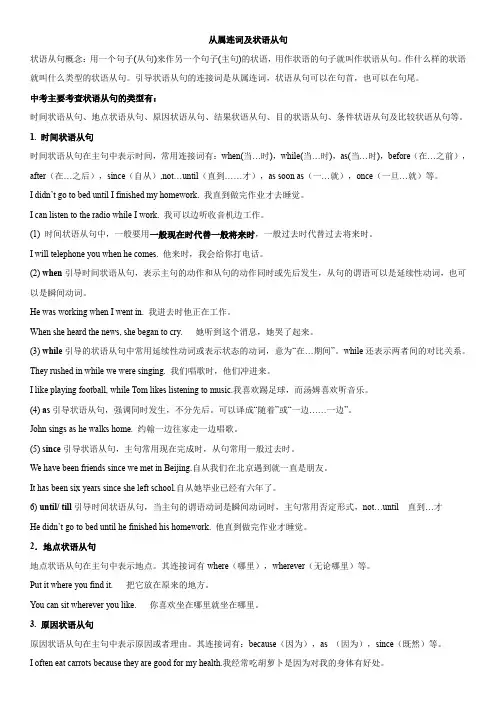
从属连词及状语从句状语从句概念:用一个句子(从句)来作另一个句子(主句)的状语,用作状语的句子就叫作状语从句。
作什么样的状语就叫什么类型的状语从句。
引导状语从句的连接词是从属连词,状语从句可以在句首,也可以在句尾。
中考主要考查状语从句的类型有:时间状语从句、地点状语从句、原因状语从句、结果状语从句、目的状语从句、条件状语从句及比较状语从句等。
1. 时间状语从句时间状语从句在主句中表示时间,常用连接词有:when(当…时),while(当…时),as(当…时),before(在…之前),after(在…之后),since(自从),not…until(直到……才),as soon as(一…就),once(一旦…就)等。
I didn’t go to bed until I finished my homework. 我直到做完作业才去睡觉。
I can listen to the radio while I work. 我可以边听收音机边工作。
(1) 时间状语从句中,一般要用一般现在时代替一般将来时,一般过去时代替过去将来时。
I will telephone you when he comes. 他来时,我会给你打电话。
(2) when引导时间状语从句,表示主句的动作和从句的动作同时或先后发生,从句的谓语可以是延续性动词,也可以是瞬间动词。
He was working when I went in. 我进去时他正在工作。
When she heard the news, she began to cry. 她听到这个消息,她哭了起来。
(3) while引导的状语从句中常用延续性动词或表示状态的动词,意为“在…期间”。
while还表示两者间的对比关系。
They rushed in while we were singing. 我们唱歌时,他们冲进来。
I like playing football, while Tom likes listening to music.我喜欢踢足球,而汤姆喜欢听音乐。
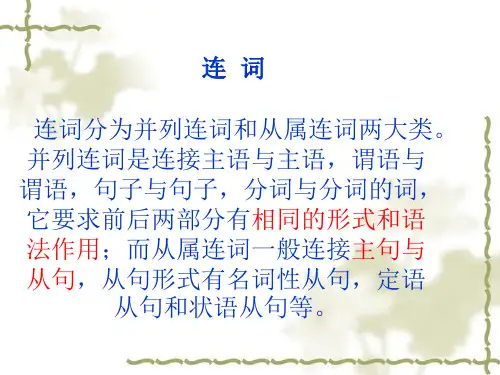
专题05 句法法之状语从句与连词连词在英语中起着至关重要的作用,能够连接同种成分,也可连接两个句子,使句子逻辑性更加紧密,文章更加通顺。
连词可分为并列连词与从属连词,并列连词连接并列句,从属连词引导九大类状语从句。
中考需重点掌握各类连词词义辨析及各类状语从句含义,同义句转换也是中考主要考查形式。
考题以单项选择、句型转化和完形填空选项中出现。
弄清主从复合句中的每一个从属连接词的意思、用法、主句与从句在时态上的呼应、语气、固定搭配及逻辑常识等。
浏览整句,判断复合句类型,根据选项聚焦引导词。
熟知每一种复合句的引导词用法,在分析句中结构的基础上,精准捕捉答案。
知识点1:并列连词重难点1.表示意思转折的连词but, yet, however2.表示因果关系的连词for, so, therefore3.其他并列连词and, or, either…or, neither…nor ; not only…but also, both…and, as well as知识点2:从属连词重难点从句种类主要从属连词1.时间从句when, while, as, before, after, until, till, whenever2.条件从句if, unless3.目的从句in order that, so that4.结果从句so…that, such…that, so that, so5.原因从句because, as, since6.让步从句although, though, even though(if), while7.方式从句as if, as though8.地点从句where, wherever9.比较从句than, as一、单项选择1.The thief was caught ________ he picked a wallet out of a man’s pocket.A.as soon as B.while C.as far as D.as long as2.He plans to have a good rest ________ he’ll have enough energy to continue his work.A.as soon as B.in order to C.so that D.now that3.____________ Ben didn’t win the race, he was still wearing a smile on his face.A.Although B.Until C.if D.Because4.The kids are taught to stay calm and go out of the building one by one ________ there is a fire.A.until B.because C.if D.although5.You can’t feed cats any chocolate ________ it’s harmful to them.A.though B.so C.while D.as6.We didn’t enjoy the holiday ________ the weather was so awful.A.though B.if C.unless D.because7.Tom will never give up smoking ________ he really realizes how harmful it is to his health.A.because B.when C.if D.unless8.I will never leave my cat ________ I make sure she is taken good care of.A.unless B.since C.if D.though9.________ you have grown up, you should think and make decisions on your own.A.Until B.Since C.Although D.When10.You'd better use the GPS with you during the journey ________ you won't get lost.A.so that B.as soon as C.as well as D.now that11.All the restaurants are listed on the paper ____________ you can choose one to have lunch easily.A.although B.because C.so that D.if12.Li Jin’s progress is ________ great ________ he is able to talk with foreigners in fluent English.A.so, that B.not, until C.such, that D.as, as13.Peter is _______ clever _______ he can work out the problem in five minutes.A.too…to B.such…that C.as…as D.so…that14.I have got _____ much work to do _____ I don’t have time to play with my friends.A.so...that B.such...that C.too...to D.enough...to 15.Nowadays online courses are becoming as________ as those learned in classes at school.A.popular B.less popular C.more popular D.most popular16.Is everything on the moon _______ it is on the earth?A.so light as B.as light as C.as lighter as D.so lighter as17._________ Jessy is only ten years old, she thinks a lot about her future.A.When B.If C.Unless D.Although18.________ we often meet inside the lift, we really don’t know each other.A.Because B.Although C.Until D.If19.A good storyteller must be able to hold the listeners’ interest ________ he reaches the end of the story.A.when B.though C.as long as D.until20.Kitty, would you please speak louder ______ everyone in the meeting room can hear you clearly?A.so that B.in order to C.since D.because一、单项选择1.Students should stay in their seats ______ all the test papers are collected.A.as soon as B.if C.until D.although2.Spiders are considered friends to gardeners ________ they eat lots of bugs that attack plants.A.although B.unless C.because D.until3._________ Jessy is only ten years old, she thinks a lot about her future.A.When B.If C.Unless D.Although4.________ we often meet inside the lift, we really don’t know each other.A.Because B.Although C.Until D.If5.The nurse won’t leave her patients ________ she’s sure they’re all taken good care of.A.if B.because C.when D.unless6.She will finish the project in time ________ the workshop is not available.A.unless B.if C.or D.after7.The passengers are asked to remain seated ________ the flight has come to a complete stop.A.if B.until C.although D.because8.Jimmy would not get up for breakfast, ________ his dad had already tried to pull him from his bed several times.A.although B.because C.if D.until9.A good storyteller must be able to hold the listeners’ interest ________ he reaches the end of the story.A.when B.though C.as long as D.until10.Computers can do different jobs ______ we give them different programs.A.if B.although C.before D.so that11.ChatGPT can finish many different tasks ________ you “chat” with it.A.if B.unless C.before D.but12.You should report your trip to the school ________ you travel outside the city.A.unless B.until C.if D.while13.________ all of us can learn to love, everything around us will be a wonder.A.Because B.If C.Before D.Although14.President Xi encourages all Chinese people to plant trees________ our country can be greener and more beautiful.A.so that B.as soon as C.even though D.ever since15.It is _________ bad weather that we decide to stay at home.A.so B.such a C.such D.so aadj16.They read the article very carefully ________ they can find out the answer as fast as possible.A.as soon as B.so that C.as long as D.now that17.You will really never know what happiness is ________ you have something to compare it to.A.if B.because C.although D.unless18.We will make few mistakes ________ we are careful enough.A.so that B.as soon as C.as long as D.even if19.Alice didn't give up looking for his missing cat ______ the police sent it back.A.until B.if C.after D.because20.The battle continued for several hours __________ darkness came on.A.as soon as B.though C.since D.until21.My best friend and I haven’t seen each other __________ she went to the USA 10 years ago A.when B.if C.although D.since22.We won't make any greater progress ___________we work much harder than ever.A.unless B.if C.and D.or23.Some students had to give up their hobbies _______ they were busy with their school work.A.though B.when C.because D.until24.We will achieve good marks ______ we keep working hard.A.even if B.so that C.as long as D.instead of 25.Alex had no interest in painting ________ he met a creative and patient art teacher one day.A.when B.because C.until D.if26.The F1 driver is hugely talented, ________ he still works hard to achieve his goals.A.so B.but C.if D.though 27.—What a heavy rain!—You’d better set out a little earlier, ________ you’ll be late for school.A.and B.but C.or D.so28.Betty was silent at first, ________ soon she joined the girls, talking and laughing.A.but B.so C.or D.and29.I called Jim last night, ________ he didn’t answer the phone.A.for B.and C.but D.or30.She tried to phone him, ________ there was no answer because he was abroad.A.since B.while C./D.but二、完成句子31.He has such a long arm that he can almost touch the ceiling. (保持句意基本不变)His arm is long he can almost touch the ceiling.32.Damin bangs the water with his pole very hard. The fish are frightened. (合并为一句)Damin bangs the water with his pole hard the fish are frightened.33.If you give him another two cakes, he will be satisfied. (保持句意基本不变)He won’t be satisfied you give him two cakes.34.He pointed out my mistakes and I realized what was wrong. (保持句意基本不变)I didn’t what was wrong he pointed out my mistakes.35.The patient was too weak to move to the door by herself. (保持句意不变)The patient was weak she couldn’t move to the door by herself.36.You have to speak very slowly, or he won’t understand you. (保持句意基本不变) you very slowly, he won’ t understand you.37.I checked the exact time for the flight in order to meet my friend on time. (保持句意基本不变) I checked the exact time for the flight I could meet my friend on time.38.He got up early in order not to miss the train. (保持原句意思基本不变)He got up early he would not miss the train.39.To keep the room clean, we need to wash pet dogs regularly. (改为复合句)We need to wash pet dogs regularly we can keep the room clean.40.I was too frightened to think clearly after I heard a terrible sound. (保持句意不变)I was frightened I could hardly think clearly after I heard a terrible sound. 41.Take the map with you, and you can find the way to Shanghai Museum.(保持句意基本不变) you the map with you, you can find the way to Shanghai Museum.42.They started early yesterday morning. They wanted to attend the lecture on time.(合并为一句)They started early yesterday morning they could attend the lecture on time. 43.I set out early in order to enjoy the sunrise with my friends. (保持句意不变)I set out early I could enjoy the sunrise with my friends.44.If you don’t keep ice cream in a freezer, it melts soon. (保持句意基本不变)you ice cream in a freezer, it melts soon.45.The road wasn’t wide enough for the bus to pass. (保持原句意思基本不变)The road was narrow the bus could not pass.46.He went to Oxford University in Britain in order to further his study.(保持原句意思)He went to Oxford University in Britain he could further his study.47.You can’t have dessert unless you finish your meal.(改为同义句)you finish your meal, you can’t have dessert.48.My father has read a lot about ChatGPT in order to keep up with time. (改为复合句)My father has read a lot about ChatGPT he can keep up with time.49.Simon left the hotel with his luggage after the rain stopped this morning.(保持句意基本不变)Simon leave the hotel with his luggage the rain stopped this morning.50.You can’t find the address so quickly unless you have a map.(保持句意不变)you have a map, you can’t find the address so quickly.。
(完整版)状语从句练习状语从句状语从句:指把一句子当着副词作状语时,修饰动词、或整个句子;根据它在句中的作用可分为时间、地点、原因、条件、目的、结果、让步、方式和比较等从句;状语从句前一般由连词(从属连词)引导,也可以由词组引导。
它常位于句首;若位于句中,常用逗号与主句隔开;位于句尾时可以不用逗号隔开。
一、时间状语从句1. 通常由以下连词弓丨导:when / while / as/ after/ before/ as soon as/ since/ till /until / by the time2. 在时间状语从句中,要注意时态一致。
(主将从现)1).when 当…..的时候: Mozart started writing music when he was four years old.2).while 在…期间: He visited a lot of places while he was traveling.3).as 在…的同时;一边…一边...: He smiled as he stood up.4).after 在...之后: He left the classroom after he had finished his homework the other day.5).before 在...之前Mr. brown had worked in a bank for a year before he came here.6).as soon as 一...就... We bega n to work as soon as we got there. I will write to you as soon as i get home.7).since 自...以来(至U现在) Mr green has taught in that school since he came to china three years ago.8)till /until 直至U : They walked till /until it was dark. Tom didn ' t leave home till / until his father came back.难点---- as/ when/ while的辨析as when while都表示主、从句动作同时发生,三者差异如下:as表示一边…一边"/随着,强调两个动作同时进行,I am cooking as I am singing.when 当…..的时候,从句动作可在主句动作"之前"或"之后"发生lit was raining hard when (as) i got there. 还可表and then; at that moment (正在那个时候/突然):I am leaving for Beijing when the phone rang.while 在…期间从句动作为延续性动词或状态词I am cooki ng while I am si ngi ng然而((表转折,对比)she thought I was talking about her daughter, while I was talking about my daughter.Mother was worried because little Alice was ill, especially as (when/ while) father was away.二、条件状语从句要点:状语从句由连词if (如果)、unless (=if not)(除非)弓I导。
语法专项突破:状语从句讲义1.时间状语从句1)when:后接时间点的动词;when也可表示“既然”,引导原因状语从句。
a.When the fire broke out,all the students were sleeping soundly.b.It was foolish of you to take a taxi when you could easily walk there in five minutes.2)while:后接一段时间;也可表示让步或对比,表示“而,却,尽管”a.Father was preparing a report while I was playing PC Games.b.While I understand what you say,I can’t agree with you.3)as表示一边…一边。
They talked as they walked along the river.4)till与unti:用肯定式时,意为“一直到…为止”。
而not…till/until结构,意为“直到…才”till不可以置于句首,而until可以a.I’ll stay here till/until the rain stops.b.He didn’t go home till/until he finished his homework.5)before和since:a.before本意“在…之前”,还可以引申为“还未…就…”“不到…就…”“…才…”“趁,还没来得及”b.It will be+一段时间+before…多久之后才…c.since意为“自从…时”,主句用完成时。
例如:①We had sailed four days and for nights before we saw land.②It will be half a year before I come back.③I have written home four times since I came here6)“as soon as;immediately;directly;the moment/minute;no sooner…than…;hardly/scarcely…when”表示一…就;①The moment I saw it,I fell in love with it.②No sooner had he reached home than it began to rain.7)“The first time;every time;by the time;any time”:by the time引导时间状语从句时,主句一般用将来完成时或过去完成时。
状语从句定义:在句中作状语的从句是状语从句,修饰主句中的动词、形容词或副词等。
状语从句由从属连词引导,从属连词在句中不充当句子成分,只起连接作用,状语从句放在句首时,要用逗号,放在句尾时不用。
状语从句主要用来修饰主句或主句的谓语。
一般可分为九大类,分别表示时间、地点、原因、目的、结果、条件、让步、比较和方式。
尽管种类较多,但由于状语从句与汉语结构和用法相似,所以理解和掌握它并不难。
状语从句的关键是要掌握引导不同状语从句的常用连接词和特殊的连接词即考点。
现分别列举如下:一、时间状语从句1.when, while和as的用法(1)when既可引导一个持续动作,也可引导一个短暂性动作.when强调主从句动作的发生有先后。
如:①When he got there, the classroom had been cleaned.他到的时候,教室已打扫过了。
(主句动作发生在从句动作之前)②He went to play football when he finished his homework.做完作业后他就去踢足球了。
(主句的动作发生在从句动作之后)when可作并列连词用,相当于just then,at the time,前一分句多用进行时、be about to或be on the point of doing,表示“正在做..,就在这时发生了另外一件事”或“届时”。
如:①I was reading when he suddenly came in.②I was about to leave when the telephone rang.(2)while强调主句动作发生在从句动作所发生的时间段内,从句的动作必须是延续性动词。
如:①Strike iron while it’s still hot.②Will you please take care of my house while I was away?在这一情况下,从句的动作一定是延续性动词,如果是非延续动词,要用when。
从属连词状语从句一、重点知识归纳及讲解(一)从属连词从属连词就是引导状语从句,宾语从句及其她从句得连词。
1.引导状语从句得从属连词有:1)when, while, before, after, as soon as, until, since等,引导时间状语从句。
2)because, as, since等引导原因状语从句。
3)if, as long as等引导条件状语从句。
4)though, although引导让步状语从句。
5)so…that…, such…that…等引导结果状语从句。
6)so that引导目得状语从句。
7)as⋯as⋯;than等引导比较状语从句。
2.常用从属连词得辨析1)when, as, whilewhen, as, while都表示“当…得时候”,但when引导得时间状语从句得动作与主句得动作可以就是同时发生,也可以先后发生,when既可指时间点,也可指一段时间,所以既可引导一短暂动作动词,也可引导持续性动作得动词。
用as作从属连词引导时间状语时强调主句与从句得动作并行发生,不指先后,尤指短动作或事件同时发生。
如:As I looked, someone came near、(正当我瞧得时候,有个人走上前来。
)as还可说咱两种正发展或变化得情况,意为“随着”。
如:As spring warms the earth, all flowers begin to bloom、(随着春回大地,百花开始绽放。
)表示主从句动作同时,as意为“一边…一边…”。
如:He hurried home, looking behind as he went、(她匆匆忙忙跑回家,一边走一边回头望。
)while只指一段时间,从句中得谓语动词不能用终止性动词,强调某一段时间内主从句动作同时发生,常对同类得动作进行对比。
如:While we were waiting for a bus, it was raining hearily、(我们在等车时,天正下着大雨。
精心整理从属连词状语从句一、重点知识归纳及讲解(一)从属连词从属连词是引导状语从句,宾语从句及其他从句的连词。
1.引导状语从句的从属连词有:1)when,while,before,after,assoonas,until,since等,引导时间状语从句。
2)because,as,since等引导原因状语从句。
3)if,aslongas等引导条件状语从句。
4)though,although引导让步状语从句。
5)so…that…,such…that…等引导结果状语从句。
6)sothat7)as?as?21)用as还可说咱(随着while生,2)till和till和…才”。
在句首。
例如:直到你告诉我,我才知道发生了什么事。
3)sincesince引导的时间状语从句常用一般过去时,其主句一般使用现在完成时。
例如:Jimhasbeeninthefactoryfortwoyearssinceheleftschool.从吉姆毕业起,他在这家工厂工作两年了。
(二)状语从句修饰主句中的谓语动词,形容词或副词等的从句叫状语从句。
例如:Hedidn'tgotoschoolyesterdaybecausehewasill.(修饰动词go)昨天他没去上学,因为他病了。
Wemuststudysowellasourteacherhoped.(修饰副词well)我们应该学得你我们老师希望的那么好。
2原因状语从句由because,as,since等连词引导。
例如:Hesoldthecarbecauseitwastoosmall.他卖掉那辆小汽车,因为它太小了。
Sinceyouwon'thelpme,Imustdothejobmyself.你既然不帮我忙,我必须自己做这项工作。
Asmymotherisawayatthismoment,Ihavetolookaftermyyoungersister.由于我的妈妈现在不在,我不得不照顾我的妹妹。
从属及状从句状从句概念:用一个句子 (从句 )来作另一个句子(主句 )的状,用作状的句子就叫作状从句。
作什么的状就叫什么型的状从句。
引状从句的接是从属,状从句可以在句首,也可以在句尾。
中考主要考状从句的型有:状从句、地点状从句、原因状从句、果状从句、目的状从句、条件状从句及比状从句等。
1.状从句状从句在主句中表示,常用接有:when( 当⋯ ),while( 当⋯),as(当⋯ ),before(在⋯之前),after(在⋯之后), since(自从) ,not ⋯ until(直到⋯⋯才), as soon as(一⋯就), once(一旦⋯就)等。
I didn’ t go to bed until I finished my homework我.直到做完作才去睡。
I can listen to the radio while I work.我可以听收音机工作。
(1) 状从句中,一般要用一般在代替一般将来,一般去代替去将来。
I will telephone you when he comes.他来,我会你打。
(2)when 引状从句,表示主句的作和从句的作同或先后生,从句的可以是延性,也可以是瞬。
He was working when I went in.我去他正在工作。
When she heard the news, she began to cry.她听到个消息,她哭了起来。
(3) while 引的状从句中常用延性或表示状的,意“在⋯ 期”。
while表示两者的比关系。
They rushed in while we were singing.我唱歌,他冲来。
I like playing football, while Tom likes listening to music.我喜踢足球,而姆喜听音。
(4) as 引状从句,同生,不分先后。
可以成“随着”或“一⋯⋯ 一”。
John sings as he walks home. 翰一往家走一唱歌。
(5)since 引状从句,主句常用在完成,从句常用一般去。
We have been friends since we met in Beijing. 自从我在北京遇到就一直是朋友。
It has been six years since she left school. 自从她已有六年了。
6) until/ till引状从句,当主句的是瞬,主句常用否定形式,not ⋯ until直到⋯才He didn ’ t go to bed until he finished his homework.他直到做完作才睡。
2.地点状从句地点状从句在主句中表示地点。
其接有where(哪里), wherever(无哪里)等。
Put it where you find it.把它放在原来的地方。
You can sit wherever you like.你喜坐在哪里就坐在哪里。
3.原因状从句原因状从句在主句中表示原因或者理由。
其接有:because(因), as (因), since(既然)等。
I often eat carrots because they are good for my health. 我常吃胡卜是因我的身体有好。
As I don’ t know the way, I had to ask the policeman由于.我不知道路,所以我不得不警察。
(1) because 表示因果关系气最,常用来回答why 提出的。
I didn’ t tell them because they were too young我没.有告他,因他太小。
(2) because 和 so 不能同在一个句子里。
Because the book was expensive, I didn’前t不buy用itso).(I4.果状从句果状从句在主句中表示果。
其接有:so⋯that ⋯(如此⋯以至于⋯), such⋯that ⋯(如此⋯以至于⋯)等。
It ’ s such a good chance that you can 次’机t会miss如此it.好,你不能失去它。
注意: so⋯that 和such ⋯that 都可以引果状从句,注意so 和such 后面所接的不同。
(1) such... thatsuch+ a(an) +形容+数可数名+that 从句such+形容+复数名/不可数名+that 从句He was such an honest man that he was praised by the teacher.他非常,因而受到了老的表。
They are such interesting novels that I want to read them once again. 些小非常有趣,我想再一遍。
(2) 但是如果名前由many 、 much 、few 、 little (少)等修,用so。
He had so many falls that he was black and blue all over. 他摔了很多跤,以至于全身上下青一,紫一的。
(3) so ... thatso+形容/副.+ that 从句so+形容+ a(an) +数可数名+that 从句He runs so fast that nobody can catch up with him. 他跑得非常快,没人能追上他。
Dr. Wang is so good that everybody loves and respects him. 他是一位好医生,大家都尊敬并戴他。
=He is so good a doctor that everybody loves and respects him.=He is such a good doctor that everybody loves and respects him.5.目的状从句目的状从句在主句中表示目的。
其接有:so(以便), so that(了), in order that(了)等,从句中多用情can, will, may, should等。
He got up very early so that he could catch the first train. 他起床很早以便于赶第一班火。
6.条件状从句条件状从句在主句中表示条件。
其接有:if(如果), unless (如果不,除非),as long as(只要)等。
If it is fine tomorrow, we will go swimming.如果明天天气好的我去游泳。
注意:在条件状从句中,一般要用一般在代替一般将来,一般去代替去将来。
Unless it rains, the game will be played. ( = If it doesn ’ t rain, the game will be played)如果.不下雨,比就将行。
As long as you tell truth , I ’ ll try只to要help你you出真.相,我就尽力帮助你。
7. 步状从句常由 though/although ( 虽然 ), even if/ though ( 即使 )等引导,但though/although 不能和 but 同时出现在一个句子里。
Though it ’ s hard work, I enjoy(it=. It ’ s hard work, but I enjoy)it.尽管这是一件艰苦的工作,但我乐意做。
She won ’ t leave the TV set even though /even if supper 即使’晚s饭on已摆the在table桌上.,她也不愿意离开电视机。
真题再现1. —Mrs. Li, will you be angry your students don ’ t obey the rules in class?(2014山西)— A little. But I will stop them in a friendly way.A. ifB. unlessC. though2. jeans were invented over 100 years ago, they're still in fashion today.(2014 江西 )A. BecauseB. IfC. AlthoughD. Since3. The teacher asked me to read aloud all the students could hear me.(2014 滨州 )A. so thatB. forC. becauseD. in order to4. — The air pollution is terrible. (2014 扬州 )— It will be worse we take action to protect the environment.A. ifB. unlessC. untilD. when5. Lin Feng has to work late, she always wears a smile on her face. (2014 南京 )A. BecauseB. IfC. UntilD. Though6. In summer milk will quickly go bad it is put into a fridge. (2014 杭州 )A. thoughB. unlessC. becauseD. once7. I don ’t like TV series it ’s boring.(2015 青海 )A .butB .and C. because8. Mr. Smith has a habit of taking a shower he has breakfast. (2015 温州 )A. thoughB. beforeC. becauseD. since9.You’d better travel around Nanjing with a local tour guide you want to know more aboutits culture. (2015 南京 )A .unless B. until C. although D. if10. Pandas are facing danger! The situation won ’t change humans stop killing . (2015 南通 )A .unless B. though C. if D. after11. — Jenny, will you leave for the USA now? — No. It will be two weeks I leave here.A. untilB. sinceC. beforeD. when12.my cousin is very young, she can help with the housework.(2015 福州 )A. Once; 不填B. Though; butC. Although; 不填。